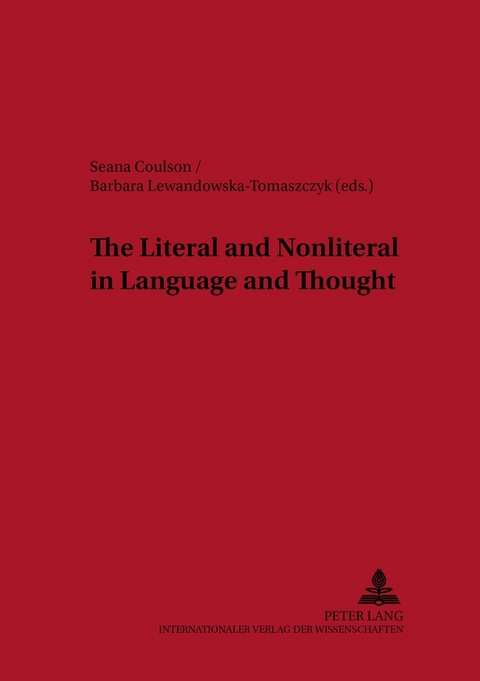
The Literal and Nonliteral in Language and Thought
Peter Lang Gmbh, Internationaler Verlag Der Wissenschaften
978-3-631-54169-2 (ISBN)
The Editors: Seana Coulson (Ph.D. 1997) is an associate professor in the Cognitive Science Department at the University of California, San Diego, where she heads the Brain and Cognition laboratory. Her research interests include cognitive semantics and experimental pragmatics, with an emphasis on the cognitive and neural underpinnings of figurative language comprehension. She is on the editorial board of Cognitive Linguistics and Annual Review of Cognitive Linguistics.
Barbara Lewandowska-Tomaszczyk (Ph.D. 1972, Dr habil. 1987) is professor of English language and linguistics at the University of Lódz, where she holds the position of professor ordinarius and chair of English language. She is also honorary professor in linguistics and modern English language at the University of Lancaster. Her research interests are primarily in semantics and pragmatics of natural language, corpus linguistics and their applications in translation studies and lexicography. She has published books and papers in the area of Cognitive Linguistics and has been President of the Polish Cognitive Linguistics Association since 2002.
lt;i>Contents: Seana Coulson: The Literal/Nonliteral Distinction - Mark Turner: The Literal Versus Figurative Dichotomy - Elzbieta Tabakowska: «Figurative»: Subjectification of Meaning in A (Literary) Text - Margaret H. Freeman: Is Iconicity Literal? Cognitive Poetics and the Literal Concept in Poetry - Barbara Lewandowska-Tomaszczyk: The Nature of Negation: Literal Or Not-Literal - Todd Oakley: Negation and Blending: A Cognitive Rhetorical Approach - Seana Coulson: Sarcasm and the Space Structuring Model - Michael Israel: The Rhetoric of 'Literal Meaning' - Begoña Vicente: Meaning in Relevance Theory and the Semantics/Pragmatics Distinction - Zoltán Kövecses: Is Thought (Meaning) Essentially Literal? The Relationship Between Literal-Figurative and Concrete-Abstract Meanings - Raymond W. Gibbs, Jr.: Literal and Nonliteral Meanings Are Corrupt Ideas: A View From Psycholinguistics - Noa Shuval/Rachel Giora: Beyond Figurativeness: Optimal Innovation and Pleasure - Benjamin Bergen: Mental Simulation in Literal and Figurative Language Understanding - Alan Cienki: Gesture and the Question of Literal Versus Non-Literal Reference - Gerard Steen: What Counts as a Metaphorically Used Word? The Pragglejaz Experience - Per Aage Brandt: Literalness and the Nature of Meaning - Mateusz W. Oleksy: Embodied Realism and Its Challenge to Philosophy - Tim Adamson: What is Metaphorical Cognition? Two Philosophical Models - Afterword: Why Literal Meaning? An Interview with George Lakoff.
«This book did raise some very interesting issues overall. The role of Aristotle and his praise for metaphor, raised in one essay, suggests that this is an important area of study for societies that had contact with ancient Greek philosophical principles [...] considering the diversity of contributors, I was impressed by the structure of the book which was, overall, cohesive.» (R Natasha Amendola, Journal of the Australian Early Medieval Association)
| Erscheint lt. Verlag | 26.9.2005 |
|---|---|
| Reihe/Serie | Łódź Studies in Language ; 11 |
| Verlagsort | Berlin |
| Sprache | englisch |
| Maße | 148 x 210 mm |
| Gewicht | 530 g |
| Themenwelt | Geisteswissenschaften ► Philosophie ► Sprachphilosophie |
| Geisteswissenschaften ► Sprach- / Literaturwissenschaft ► Slavistik | |
| Geisteswissenschaften ► Sprach- / Literaturwissenschaft ► Sprachwissenschaft | |
| Schlagworte | Abstract meaning • Barbara • Bedeutung • cognitive linguistic • Construction grammar • Coulson • Kongress • language • Lewandowska • Literal • Logroño (2003) • Nichtverbale Kommunikation • Nonliteral • Seana • Sprache • Thought • Tomaszczyk |
| ISBN-10 | 3-631-54169-4 / 3631541694 |
| ISBN-13 | 978-3-631-54169-2 / 9783631541692 |
| Zustand | Neuware |
| Haben Sie eine Frage zum Produkt? |
aus dem Bereich


